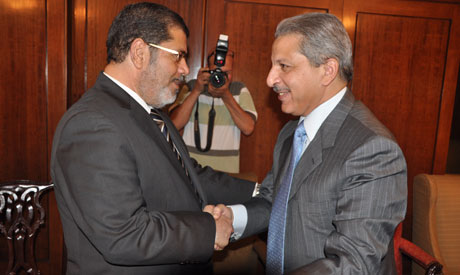
Morsi (L) and Al-Qattan during the meeting (Photo: Saudi Embassy's media bureau)
Anwar Eshki, an advisor to Saudi Arabia's Cabinet of Ministers and head of the Jeddah-based Middle East Centre for Strategic and Legal Studies, accused Egypt's Muslim Brotherhood of lacking the requisite political vision and experience for governing the country.
Eshki, in an interview with Al-Ahram, expressed his fears on the "doubted aspirations" of the Islamist and most politically-based entity which in the minds of many is seeking to extend its control over the country and pave the way for the reproduction of despotism in Egypt.
"If no roadmap is drawn, the Muslim Brotherhood will have a tripartite stronghold over the executive, legislative and judicial authorities," he stated.
Eshki also described the transitional phase in the post-Mubarak era as a "tough process" for the whole nation, negotiating the different stages of transformation from authoritarianism to a freedom-based political system.
"I hope that democratic progression will be achieved quickly; Egyptians could not afford the price of other alternatives," Eshki said.
The Brotherhood and Saudi Arabia share Sunni Muslim values, but Riyadh regards the movement as a competitor with an aggressively activist political doctrine that might destabilise allies and foment discord inside the kingdom.
Permeating Saudi worries about the Muslim Brotherhood are decades of ideological rivalry.
Since the 18th century, the ruling Al-Saud family has enjoyed a close alliance with clerics of the ultra-conservative Wahhabi school of Islam.
In the modern kingdom, the royal family has bankrolled the clergy and given them wide-ranging influence over government policy. In return, the clerics have espoused a political philosophy that demands obedience to the ruler, a notion that shaped Saudi dismay at last year's Arab revolts.
By contrast, the Muslim Brotherhood has always promoted an active political role for Islam, first as a revolutionary organisation and more lately as a force in democratic politics.
Some Saudi leaders have accused the Brotherhood of inspiring the kingdom's main domestic opposition group, the Sahwa movement that in the 1990s agitated to bring democracy to Saudi Arabia.
Last month, Ahmed Al-Qattan, Saudi Arabia's ambassador to Egypt, stressed that the oil-rich kingdom does not support any particular Egyptian presidential candidate over another, refuting allegations that his country is pushing for an Islamist Egyptian president.
Al-Qattan's words, according a press release issued by the Saudi Embassy in Cairo, came in a meeting with presidential contender Mohamed Morsi, head of the Muslim Brotherhood's Freedom and Justice Party (FJP), outside the embassy's premises.
Short link: